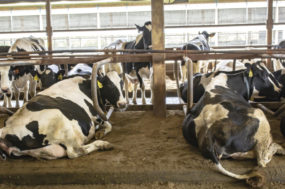If yogurt is made from milk that came from cows that ate feed including genetically modified corn, can it be labeled as “natural”? This was the question recently before a New York federal court.
Background
Polly Podpeskar filed a proposed class action lawsuit on behalf of herself and other consumers who were misled by Dannon’s “natural” label on certain yogurt varieties. She claimed a reasonable consumer would not expect a “natural” product to be made from milk from cows who had been fed genetically modified corn or had been raised using hormones and certain other “non-natural processes to increase milk production.”
She claimed she, and others similarly situated, relied on these misrepresentations to their detriment. Specifically, she made claims under Minnesota statutes (Deceptive Trace Practices Act, False Statement in Advertising Act, and Consumer Fraud Act) along with claims of fraud and breach of warranty.
Dannon filed a motion to dismiss the case, arguing the plaintiff had not stated a valid legal claim.
Standard of review and applicable law
When a court reviews a motion to dismiss, it assumes all of the factual allegations set forth by the plaintiff’s complaint are true and determines whether, given those facts, a viable legal claim has been made.
With regard to consumer protection claims, the court applies a “reasonable consumer” standard, asking whether the advertising at issue was “likely to mislead a reasonable consumer acting reasonably under the circumstances.”
Finally, the FDA is currently reviewing the use of the term “natural” to determine how it may be regulated in the future. Currently, the FDA policy is informal and defines natural as “nothing artificial or synthetic ... is included in, or has been added to, the product that would not normally be expected to be there.” Additionally, current federal law does not require end products of animals fed GMO feed should be labeled as containing GMOs.
Court opinion
In December 2017, the U.S. District Court for the Southern District of New York dismissed the case.
The court found the plaintiff’s claims were based on her feelings GMO products were not natural. Further, she offered no evidence of the feed actually fed to cows whose milk was used to make Dannon yogurt; instead, she based her case on her own speculation that because most of the milk in the U.S. is from cows given feed with GMO ingredients, the milk used by Dannon to make the yogurt she purchased was from cows fed GMO corn.
Further, she offered no evidence she was unaware the products were not wholly produced by milk from cows fed no GMOs.
On the contrary, statements by Dannon that they were “working with feed suppliers and farmer partners to start planting non-GMO feed ...”, along with a host of surveys on this topic offered as evidence by the plaintiff, indicated she did have information Dannon’s products were likely from cows fed GMO feed.
As the court explained, “Plaintiff does not allege that any ingredient used in the products is unnatural; her claim is that, several steps back in the food chain, there may have been something unnatural ingested by a cow ... There is no legal support for the idea that a cow that eats GMO feed or is subjected to hormones or various animal husbandry practices produces ‘unnatural’ products.”
Takeaways
This case is a good reminder about the legal issues surrounding food labeling and advertising. There are cases across the country challenging what food products can and cannot include on their labels and packaging.
Further, it is a good reminder consumers are interested in where their food comes from, and those of us involved in agriculture and the food industry must keep that in mind. ![]()

-
Tiffany Dowell Lashmet
- Assistant Professor and Extension Specialist
- Texas A&M AgriLife Extension Service
- Email Tiffany Dowell Lashmet





